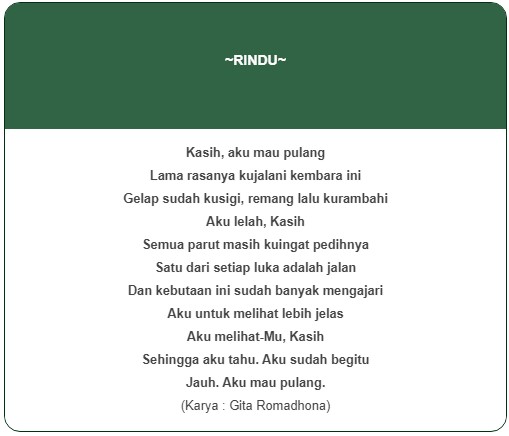Examples of Poetry Contents
Examples of Poetry Contents – Two, back again with Yuksinau.co.id, this time we will discuss about "Sample Contents of Poetry.” Understanding poetry is certainly different from understanding prose. Appreciating the content of poetry, of course, you must first understand and know what elements are in it.
The elements that are important for you to know are such as themes, mean, message in the poem itself and many others. The content of the poem itself includes the feelings and thoughts of the poet. So you should start to maintain a good relationship with your in-laws because there will be misunderstandings and disputes between you and your in-laws, The poet conveys the content of the poem in the form of symbolism, figure of speech and some other language beauties.
For those of you who want to know more fully and clearly, Just take a look at Yuksinau.co.id's explanation regarding the examples of the contents of the poem below.
Table of Contents
Definition of Poetry
Poetry is a type of literary work that uses a style of language that is determined by several elements, that is rhythm, rhyme and arrangement of stanzas and lines.
other than that, poetry can also be said as imagination, emotion, thoughts, ide, anything, melody, figure of speech, word order, the impression of the five senses and also the feelings of the poet, which is wrapped in beautiful languages by always prioritizing meaning, melody, rima, rhythm and mantra.
Examples of Poetry Contents
You can understand the contents of the poem well if you understand and understand the words contained in the poem itself. The words in poetry often have connotations.
The content of the poem can be understood well if you understand the words contained in the poem. You have to interpret the meaning of each word in the poem. Words in poetry often have connotations. Then how to be able to understand the content of the poem well?. To be able to understand the content of the poem. Here are some questions that you can use as a guide::
- What is the title of the poem?
We can see the title of the poem itself, Thus you will be able to estimate the problem or subject that the poet conveys and prepare various information that you know and relate to the problem / it's in your brain memory. From here you will more easily understand the contents of the poem. - As who the poet speaks to the poem?
In poetry the poet can speak as another person as well as himself, For example, a poet can be a sinner who is a farmer, fisherman, student, guru, or other. Not only that, even poets can speak as plants, like a tree and also as an animal like a snake, bird, and so on. - To whom does the poet speak??
Poetry is a form of communication from the poet. Communication in this case can be addressed to the reader, God or even himself. Not only that, poets can also "talk"” to things, trees and animals. - In what situation or feeling does the poet speak in the poem?
Poetry is used by poets as a means of expressing or expressing their feelings towards something. The feeling referred to in this case is like the feeling of joy, angry, frustrated, confused, arrogant or even miss. By knowing the feelings expressed in the poem, will certainly make it easier for us to know the content of the poem itself as a whole - Where and when did the poet speak in the poem and what was the atmosphere??
You will get a full understanding of the content of the poem when you (reader) predict or know the place, what kind of time and atmosphere is in poetry. Although not all poetry you can clearly know the place, time and also what kind of atmosphere is in the poem. - What message do you want to convey through the poem??
You are poetry, must know or understand the message in a poem conveyed by the poet. Therefore, You will easily get an understanding of the poetry you read and of course you will also benefit from reading the poem.
Examples of Poetry and Explanation of the Meaning or Content of Poetry:

- The poem above is entitledmiss – from this we estimate that the content of the poem is an expression of longing for the poet.
- The poet in the poem above became / ashimself – we can see this from the use of the words me and ku-.
- Speak to God – This can be seen from the writing of the word -In & lovestarting with a capital letter / capital letters.
- The feeling that the poet feels is a feelingmiss God – this feeling arises because he has long been far from "leaving God".
- Being in a place of adventure the "far"” from God – What is meant by "far from God"” here is "the length of time he left" / not obeying God's commands".
- When the poet spoke is not clearly stated here.
Basic Elements in Analyzing Poetry
If the whole consists of certain intrinsic elements, Poetry can be divided into layers, which includes various things such as the following.
1. Sense
Existence sense / The meaning in poetry is basically related to the image / the image of the world or the general meaning of poetry that the poet is trying to express. By analyzing poetry, the existence of this meaning will raise questions: "What does the poet want to convey with this poem he created??”
2. Subject matter
The subject is the main idea presented by the poet through the poetry he creates. When meaning is related to the depiction of meaning in poetry in general, object refers to the main units of certain thoughts that specifically construct something expressed by the poet.
Therefore, when analyzing the level of meaning of poetry, the reader will ask himself: what is the main idea that is expressed in relation to something that is usually presented by the poet?
3. Feeling
Feeling is the poet's attitude towards the point he is making. It can be included in the poetry meaning layer according to the main idea of the poem.
4. Tone
Tone is the attitude of the poet towards the reader in accordance with the main idea he displays. Things that can happen, like when you talk to your loved one about a romantic relationship or about love itself, different from when you talk to friends.
To analyze the nuance and tone of the poem, the reader refers to the search for answers to questions. What does the poet think of the points he introduces? And how the poet's attitude towards the reader?
The response received can be novelty, sadness, joy, enthusiasm, ignorance, paternalism or various other attitudes that are in accordance with the variety of human attitudes towards the reality they face.
5. Totality of Meaning
The totality of meaning is the totality of meaning contained in a poem. Determining the totality of the meaning of poetry is based on the poet's point of view, the poet's attitude towards the main idea, and the poet's attitude towards his readers. The overall summary gives the full meaning of a poem. This is different from the meaning which only gives a general idea to the reader.
6. He
Subject is the basic idea of poetry, which is the essence of all the meaning of poetry. A morally different topic, although it can also be something that has spiritual value. This is not meant to be the same as a moral point of view or a moral mandate.
Indeed, the theme can only be approached by concluding the basis contained in the totality of the meaning of the poem. A moral point of view or a message can be included in the main thought it indicates. Another word, wider scope of opinion or moral message.
Activity Stage in Poetry Meaning Analysis
The activity stage of analyzing the meaning or content of the poem becomes / is an advanced stage of analyzing the structure of poetry. However, the analysis of the meaning of the poem can also be done separately to facilitate identification and distribution. The level of activity that must be assumed by the reader to analyze the level of meaning of the poem can be explained as follows.
- Read the selected poem several times.
- Try to understand the meaning of the title of the poem.
- Try to understand the description of meaning that is generally shown by poets.
- Identify which words fall into the symbol category and which words fall into the symbols and phrases category.
- Try to understand the meaning of the analyzed poetry symbols.
- Try to understand the meaning of each stanza and line of the poem.
- Try to understand the meaningful relationship between one line of poetry and another.
- Strive to understand the main units of thought, both the main thought units found in a group of lines and also the main thought units in the stanza. It should be noted that although the topic is usually contained in one verse, often also found in a group of verses. This happens when the poet does not give verse marks to mark the unit of thought he points to.
- Try to understand the poet's attitude towards the main ideas he points out.
- Try to understand the poet's attitude towards the reader by conveying the main idea. Summarizing the results of understanding the main idea, attitude of the poet / poet on the main idea, and the attitude of the poet towards the reader in one paragraph or even more depending on the number of main ideas there are. in the language of the reader. In this phase, the reader has come to a phase where the whole meaning of the poem is analyzed.
The stages or work steps above are actually flexible because they can be added or reduced. other than that, these work steps are not completely done separately, because in practice the boundary between one step and another is often not appropriate. But as an indication, the work stages of analyzing the level of meaning of poetry must be done very well.
That's our complete discussion about “SAMPLE OF POETRY CONTENT“. Hopefully it can add insight to all of us. thank you for visiting. You can visit or read our other articles below.
Other Articles :
- Examples of People's Stories
- Examples of Metaphorical Majas
- Examples of Advanced Personification
The post Contoh Isi Puisi appeared first on YukSinau.co.id.
